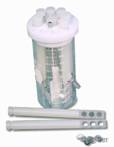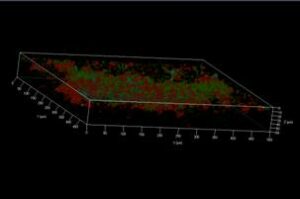 Antimicrobial equipment of medicinal implants to prevent bacterial biofilm formation
Antimicrobial equipment of medicinal implants to prevent bacterial biofilm formation
This project funded by BIG Bremen (Bremer Investitions-Gesellschaft mbH) in collaboration between Jacobs University Bremen and Bio-Gate AG.
A biofilm is a structured community of bacterial cells enclosed in a self-produced polymeric matrix (consisting mainly of exopolysaccharides) and adherent to a liquid-submersed inert or living surface (Costerton, Science 1999).
Biofilm can have some positive aspect, for examples, in agronomy (colonization of root surfaces) and industry (bioremediation, biomass reactor) as negative aspects, for examples, bio-corrosion and infections in hospital (water distribution and medical devices).
Bacterial infection on implanted prosthetic materials represents one of the major problems of public health and one of the first causes of nosocomial infections.
To prevent formation of biofilm on surfaces, a silver nano-particles doped polymer coating is applied to the surface. Silver ions, released by oxidation of silver nano-particles, strongly inhibit the growth of bacteria and other microorganisms. Mechanistically silver ions inhibit important cell structures and lead to cell death.
We study the formation of biofilm of Pseudomonas putida KT 2440 grown on the silver coating in a CDC Biofilm reactor.
Formation and structure of biofilm is studied by confocal laser scanning microscopy and scanning electron microscopy (SEM).
3D reconstruction biofilm

